Recent News

YASMINE RADWAN RECEIVED NSF INTERN SUPPLEMENTAL FUNDING
Yasmine Radwan has received NSF INTERN supplemental funding to Dr. Kirill Afonin’s NSF grant that will support her six month internship at MIMETAS. This opportunity will augment Yasmine’s research assistantship in the Afonin Lab with non-academic research internship training opportunities that will complement her academic research training.
This funding provides her with financial support of $55,00 that will be used to support travel, tuition and fees, health insurance, additional stipend and temporary relocation costs. This funding opportunity will allow her to acquire professional development experience that will enhance her preparation for multiple career pathways after graduation. Congratulations to Yasmine Radwan and Dr. Kirill Afonin!
Read more about the NSF INTERN supplemental funding.

RUBY MANDERNA AWARDED MoISSI FELLOWSHIP
Ruby Manderna has been awarded a highly competitive Molecular Sciences Software Institute (MolSSI) Software Fellowship to promote the development of software infrastructure, middleware, and frameworks for broader impact in the field of computational molecular sciences, quantum chemistry, and materials science. Ruby was chosen for this prestigious fellowship on the basis of an outstanding research proposal, which integrates scientific and software development goals, and a review of her significant contributions and productivity in the field of open-source software development. This fellowship provides her with financial support of $40,000 stipend for one year beginning in July of 2024 covering the tuition and required fees for the award year allowing her to pursue cutting-edge research and professional development opportunities. This award not only honors her past achievements but also paves the way for a promising and impactful future. Congratulations to Ruby on this well-deserved honor!
Read more about the fellowship.

YELIXZA AVILA: FROM FIRST-GEN TO POSTDOC
In March 2024, Avila was selected as an iCURE scholar for a postdoctoral fellowship with the National Cancer Institute. iCURE is an extension of the NCI Center to Reduce Cancer Health Disparities highly competitive and successful extramural Continuing Umbrella of Research Experiences training program. CURE supports the career progression of scholars working toward research independence and fosters diversity in the biomedical research pipeline.
It also offers three-year awards for postdoctoral fellows and provides opportunities to work closely with world-class researchers at the National Cancer Institute. Awardees receive support from NCI program staff, access to resources on intramural and extramural funding opportunities, opportunities for professional and career development activities, and connections to an extensive mentoring network. Avila also will receive a stipend as a first-year iCURE postdoc scholar.
Read more about Yelixza’s story.

JORDAN POLER AWARDED NCINNOVATION GRANT
Jordan Poler, professor of chemistry, has been awarded a grant through a pilot program from NCInnovation. He is one of two UNC Charlotte faculty selected for the funding and among eight researchers chosen from the UNC System.
The grant will allow Poler to expand on his team’s recent innovations in water purification that have led to the creation of patented materials capable of removing harmful compounds more effectively than current market solutions.
At UNC Charlotte, Poler leads a research group that includes students from various disciplines focused on the development of advanced materials.
Poler founded startup naneXPure LLC and will work with Goulston Technologies, based in Monroe, to scale up the drinking water purification materials from bench to industry scale. Poler’s research on water purification materials, which includes the synthesis of polyelectrolytes, novel coordination complexes and nanostructured materials, shows the potential of nanoscale science to create impactful, real-world solutions to improve public health, he said.
Poler, a Fulbright scholar, has previously received grants from the Environmental Protection Agency, the National Science Foundation and the Department of Defense for his research on water purification.
Read more about the grants awarded to UNC Charlotte researchers.

WALTER AND HANNA RECEIVED NSF GRANT
The grant will support a collaboration involving both UNC Charlotte and Winthrop researchers to explore photocatalysis with thiazolothiazoles. Photocatalysis is one of the most active areas of development in synthetic chemistry and pharmaceutical development, but much of the field has relied on scarce elements for the catalyst itself. This new research program will develop photocatalytic systems based on more sustainable practices, while also strengthening the connection between the two chemistry departments. Read more about the award: “Exploration and Development of High Performance Thiazolothiazole Photocatalysts for Innovating Light-Driven Organic Transformations.”
News

Professor Christopher Bejger has received an NSF CAREER Award from the Solid State and Materials Chemistry program in the Division of Materials Research to develop a new class of redox-active metal-organic frameworks (MOFs) comprising transition metal chalcogenide (TMC) molecular clusters. TMC clusters exhibit rich electrochemical behavior and have a propensity to undergo reversible, multi-electron transfer […]
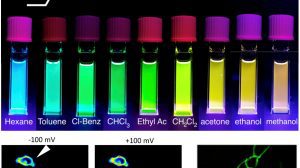
“The goal of this NIH-funded project is the development of highly fluorescent thiazolothiazole (TTz) materials as molecular sensors for tracking cell membrane potentials. Tracking the changes in cell membrane potential offers the potential to gain a deep understanding of complex and rapidly changing cellular physiology. Fluorescent, small molecule voltage sensitive dyes (VSDs) have greatly impacted […]
Margaret Kocherga, a fourth-year student in the Nanoscale Science Ph.D. program in the Schmedake Research Lab and a UNC Charlotte alum (B.S. Chemistry) recently won First Place in the Innovate Carolina 2020 Student Innovation Competition sponsored by the Product Development and Management Association. Conratulations Margaret!
Margaret Kocherga, a fourth-year student in the Nanoscale Science Ph.D. program in the Schmedake Research Lab and a UNC Charlotte alum (B.S. Chemistry) was named as one of six new innovators selected to join Chain Reaction Innovations (CRI), the entrepreneurship program at the U.S. Department of Energy’s (DOE’s) Argonne National Laboratory, as part of the […]

The NSF Chemical Structure, Dynamics & Mechanisms-B Program of the Chemistry Division has awarded a grant (#1955619) to Professor Christopher Bejger at UNC Charlotte to develop hexasubstituted [3]radialene molecules for use in organic aqueous redox-flow batteries. This project is important for developing low cost and environmentally friendly energy storage devices. The Bejger Lab will collaborate […]
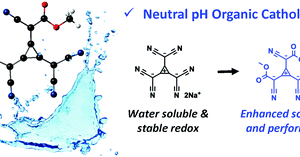
The Bejger lab has recently published an article title “Desymmetrized hexasubstituted [3]radialene anions as aqueous organic catholytes for redox flow batteries” in the Journal of Chemical Communications. The article may be found here. Here is an abstract of the published work: “Negatively substituted trimethylenecyclopropane dianions, a subclass of hexasubstituted [3]radialenes, are candidates for use as […]
Congratulations to Abhsipa Sahu for recieving an EPA P3 Phase 1 fundding for her grant “Green & Sustainable Water Purification Membranes”! Abhispa is a Ph.D. student in Dr. Jordan Polers lab. To read more about the awarded grant, click here. To read more about Dr. Poler’s lab, click here.
Congratulations to Margaret Kocherga and Morgan Chandler for tying for first place at the Poster 2.0 Competition! This competition is inspired by the #betterposter revolution that is drastically changing the way scientific research is presented at conferences. Morgan works in the Afonin lab. Margaret works in the Schmedake lab. Congratulations Morgan and Margaret!
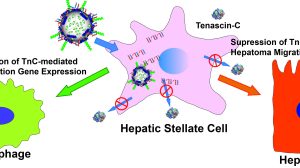
Chronic liver dysfunction often begins with hepatic fibrosis. A pivotal event in the progression of liver fibrosis and cirrhosis is hepatic stellate cell (HSC) activation and secretion of extracellular matrix proteins, including tenascin-C (TnC). TnC is often chosen as a therapeutic target for treatment of liver disease. TnC is minimally detected in healthy tissue, but […]

Abhishek Shibu of the Walter lab won both first place and the people’s choice award at the 3MT with his “Let There Be ‘BLUE’ Light” presentation. Abhishek will now go on to compete in the 3MT regionals and represent UNC Charlotte. For information, click here. Congratulations Abhishek! Margaret Kocherga of the Schmedake lab was also […]
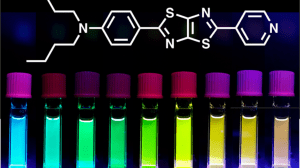
The Walter lab recently published a paper in the Journal American Chemical Society (JACS). Here is a brief description of the paper. Donor-acceptor, small molecule fluorophores are attractive tools for both environmental and biological sensing applications due to their high sensitivity, selectivity, and spatial/temporal resolution. In our recent paper, we report on a new molecular […]
Dr. Cooper recently published an article in Analytical Chemistry: Tandem mass spectrometry (MS/MS) can be used to identify metabolites in biological samples by searching against a library of spectra obtained from known compounds. But the best match from a library search is guaranteed to be incorrect if the unknown is not (yet) in any library. […]
Congratulations to Dr. Kirill Afonin (Chemistry) for receiving a UNC System Inter-Institutional Planning Grant (IPG) together with UNCG, NCCU, and NCSU. Dr. Afonin is a lead PI on the project that aims to establish a strong research team that will rely on continuous collaboration among diverse institutions and disciplines to address fundamental design aspects of […]
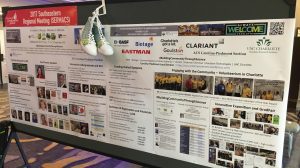
The Carolina Piedmont local ACS section, chaired by Dr. Jordan Poler, has won the ACS ChemLuminary Award for best regional meeting in 2017. Many of UNC Charlott’s chemistry faculty contributed to this meeting as symposium chairs, LOC members, and volunteers during the meeting. A great team effort recognized by our professional organization!
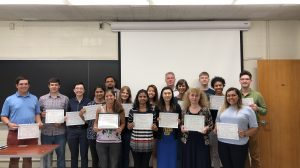
Congratulations to the cohort of students who successfully completed a two-week workshop on “Molecular and Cellular Immunology: from Basics to Applications in Preclinical Development of Nanotechnology-Formulated Drugs.” This workshop organized by the Afonin Lab in the Department of Chemistry covered topics including an in-depth review of cellular and molecular immunology, basic principles of immunotoxicology and […]
Nanoscale Science PhD student Margaret Kocherga was recently featured in CLAS magazine Exchange. The article highlights some of Margaret’s achievements including receiving the award for best oral presentation by a student at the 50th North American Silicon Symposium, completing UNC Charlotte’s Ventureprise Launch NSF I-Corps program, and earning the Younger Chemists Committee Leadership Development Award […]
Dr. Michael Walter and recent Nanoscale Science PhD student Meesha Kaushal completed the Ventureprise Launch NSF I-Corps program at UNC Charlotte, participating in over six weeks of entrepreneurial seminars and programming. After determining the kits could be commercially viable, they successfully competed for a national I-Corps Team Award. A $50,000 grant has provided financial support […]
Dr. Kirill Afonin was a finalist for the Integration of Undergraduate Teaching and Research Award. Chemistry Department Chair Bernadette Donovan-Merkert describes Afonin as one of UNC Charlotte’s top researchers. “He is also an effective mentor for students in his research group, and he has developed an innovative course that truly engages students in research and […]